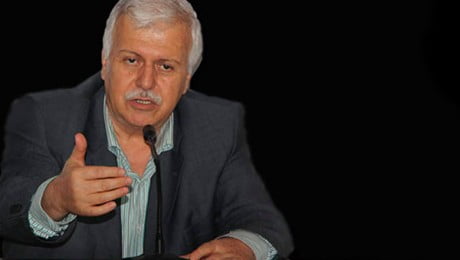Keyword: Turkey

Hakan Şükür’s resignation
The resignation of İstanbul deputy Hakan Şükür from his ruling Justice and Development Party (AK Party) is not an ordinary resignation. It is the most serious incident that disrupts the prestige of the AK Party in the eyes of pious voters.
Şükür’s statement about his resignation must be carefully studied. This statement explains the Hizmet movement’s perspective regarding the recent row between the government and the Hizmet community for the first time and with a clear wording.

What is this bedlam all about?
So, as expected, Prime Minister Recep Tayyip Erdoğan declared all-out war. The enemy — what he and his advisers regard as “the junta formation within the police,” the media, the judiciary, the American Embassy, affiliates of the mainly volunteer Hizmet movement, and, well, whoever seems to disagree with the way he intends to run the country and whoever tends to believe there is no smoke without fire — have dug their trenches in a circle.

The Islamic roots of the conflict in Turkey
he roots of the Gülen movement go back to Said Nursi (1878-1960), a preacher from Eastern Anatolia whose teachings (the Nurcu movement) emphasized the compatibility of Islam with rationalism, science and positivism. Nursi’s main contribution to Islam was a 6,000-page commentary he wrote on the Quran. This body of work is known as the “Risale-i Nur” (The Light Collection) and advocates the teaching of modern sciences in religious schools as the way of the future for an Islamic age of enlightenment.

Alevi leader Kenanoğlu: Discrimination against Alevis increased in 2013
It must be realized that religion is a matter for individual citizens. It is likely that the Gülen community will face restrictions and pressure from the government [as the AK Party government’s supporters have accused the Gülen movement of discrediting a number of ministers and their relatives in relation to a recent investigation into alleged bribery in public tenders, which saw the sons of three Cabinet ministers taken into custody alongside construction moguls and bureaucrats]. What we have been defending are universal rights, including the freedom of religion and belief. If these can be achieved, everybody will benefit from them, not just the Alevi community.

‘Power struggle with Gulen movement weakens Erdogan’
The [Hizmet] movement was formed by Gulen’s sermons – he knew how to reinterpret Islam’s moral and ethical demands. It’s not just about continuing traditions, but about exploring nature, seeing God in the laws of nature and the laws of physics and about finding God again.

For first time, Fethullah Gülen curses purge of police officials in emotional speech
Fethullah Gülen has cursed those responsible for a purge of police officials involved in a corruption investigation. Turkish PM Tayyip Erdoğan has called the detention of scores of people seen as close to the government a “dirty operation” aimed at undermining his rule. Erdoğan has refrained from naming Gülen as the hand behind the investigation and he referred to an “illegal gang within the state” and systematically purged officials, including journalists in public broadcasters.

Iranian gold stars in Turkish corruption scandal
It is difficult to predict how the bribery/corruption investigation into several Turkish ministers will end. Although there are those who frame the event as a power struggle between the Fethullah Gulen movement and the government, conspiracy theories expand its dimensions to include the United States and Iran. The government is looking for US and Israeli hands in the operation because of the use of Halkbank to circumvent the sanctions imposed on Iran.

Turkey’s post-revolutionary civil war
What does this corruption investigation has anything to do with the AKP-Gülen Movement tension? Well, the prosecutor who apparently led this investigation in big secrecy, Zekeriya Öz, is believed to be a member of the movement. Corruption is a serious matter and the real best defense would be to help bring those who are charged to justice. Meanwhile, the Gülen Movement, normally a civil society group, should help save itself from the image of secrecy and infiltration that it has been drawn into in the past decade.

Hizmet movement and perceptions
We are going through a very critical period. We need the common sense and support of all the precious members of the Hizmet movement as we have never needed them before. We must protect our democratic gains. I pen this article as a person who closely sided with the Hizmet movement during the attacks of Ergenekon — a clandestine organization nested within the state trying to overthrow or manipulate the democratically elected government — and the deep state, and who backed its justified objections to the government’s plan to shut down the prep schools.

Turkish PM Erdoğan’s imagined enemies
Turkey is no longer the old Turkey. The affluent middle class, the young population and stronger civil society organizations, strengthened by the digital revolution with such tools as social media and Internet portals, will resist any attempts to turn the clock backwards on the development of Turkish democracy. People will simply ask why Prime Minister Erdoğan is not going after his people who have been sleeping with the enemy next door if he is really sincere in addressing external threats to this great nation.

Toward a constitutional crisis [in Turkey]
If the government continues to give the impression that it is trying to stop the biggest-ever corruption investigation in the country, Gezi may repeat itself. It is clear that this may harm not only the AK Party, but also the Hizmet movement and Turkey. Only the AK Party can stop this from taking place by convincing people that it is not interfering with the judiciary and that it is fully against corruption.

Operation and crossroads: Hizmet movement falsely accused
The delicate position in which the government now finds itself is real, but it is also a fact that the Hizmet movement is being falsely accused.
Those who support the Justice and Development Party (AK Party) and are affiliated with the Hizmet movement do not deserve such an outcome.

Erdogan caught off guard in latest political crisis
Nobody thought Turkey’s powerful Prime Minister Recep Tayyip Erdogan would be caught so off guard — not after last summer’s Gezi Park protests — as he apparently was before the major graft probe, which involves four of his ministers, including the minister of interior and his sons. It is clear he sees a “shadow state” behind the operation and holds the Gulen movement responsible. Indications are Erdogan intends to “strike back” with a massive purge within the police.



















